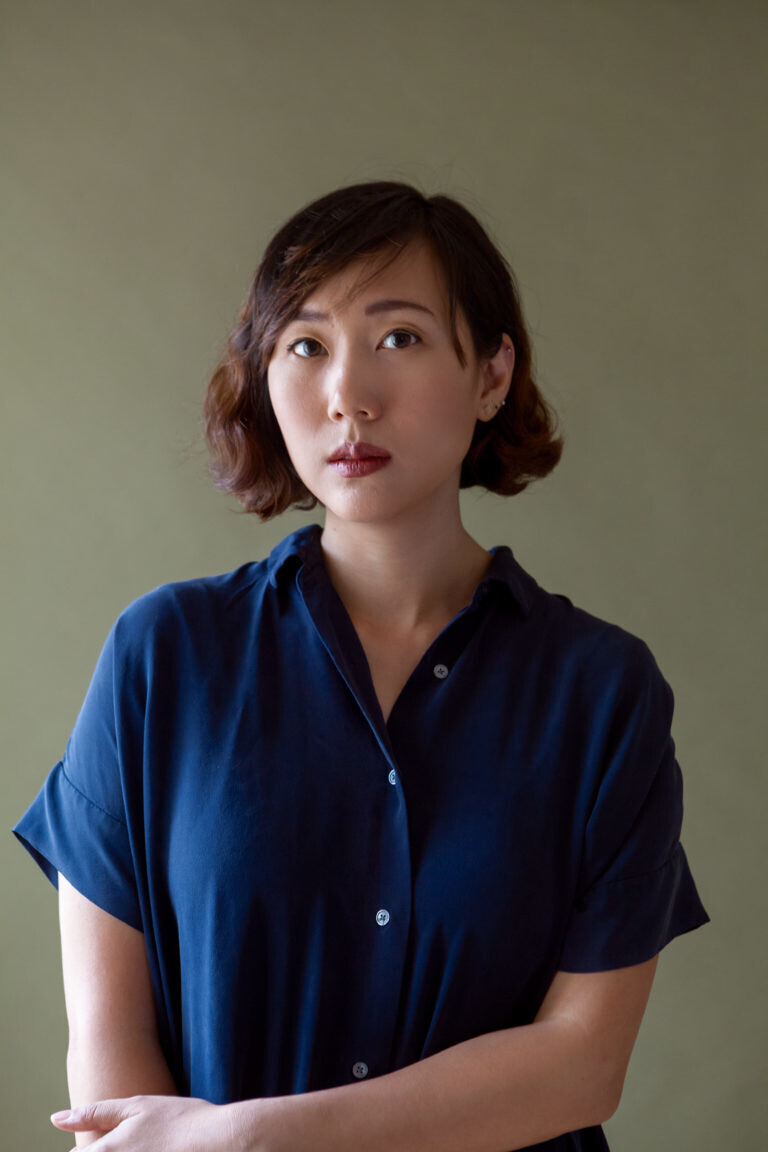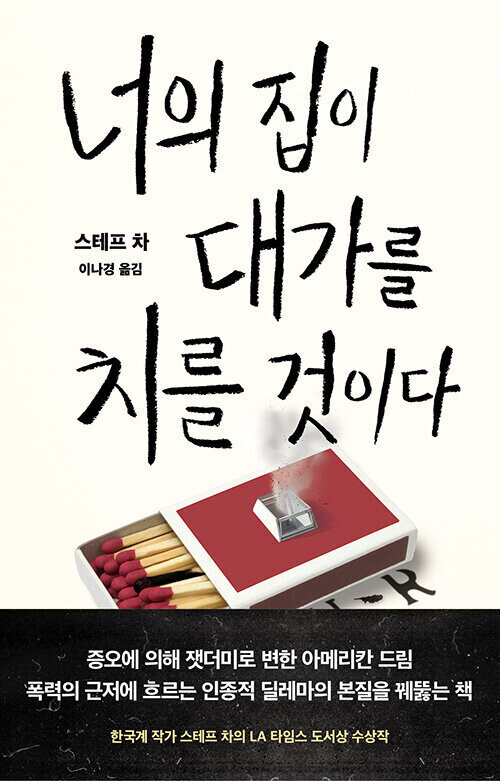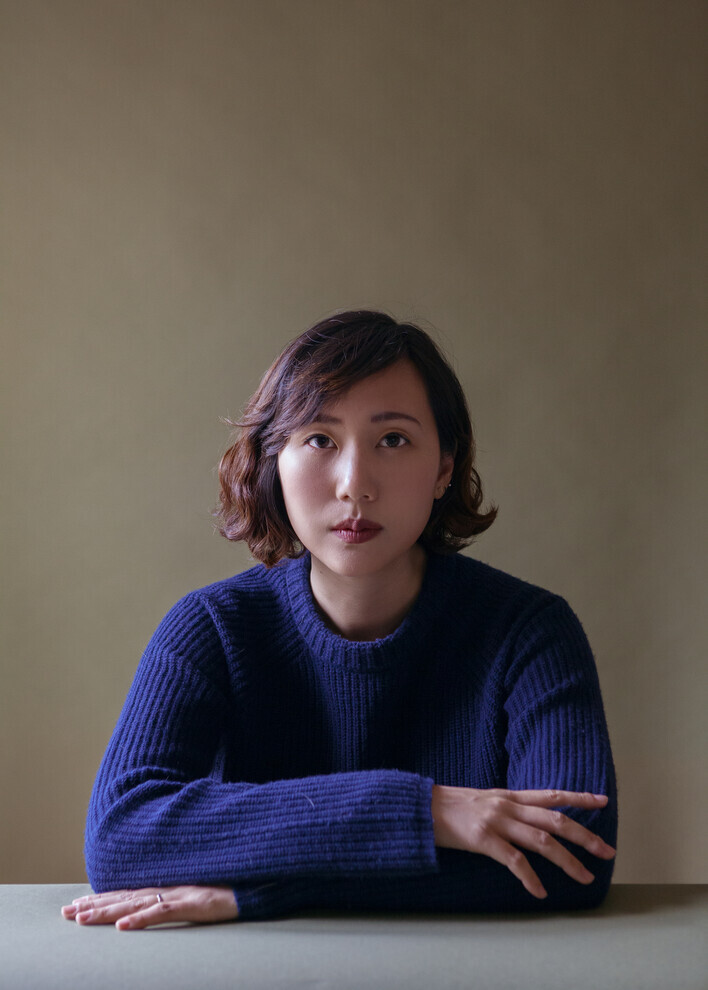hankyoreh
Links to other country sites 다른 나라 사이트 링크
[Interview] Korean American author Steph Cha says white-dominated system exploits Asian-Black conflict

Korean American author Steph Cha’s novel “Your House Will Pay,” which is set during the Los Angeles riots of 1992, won the 2019 Los Angeles Times book prize in the mystery/thriller category.
In March 1991, Korean American Soon Ja Du shot and killed a Black teenage girl named Latasha Harlins, mistakenly thinking that Harlins was trying to steal from her store. That killing went on to influence the LA riots in April 1992, when many Korean American stores were looted and burned.
“Your House Will Pay” focuses on a Korean family and a Black family, representing the two sides in Harlins’ killing, as it delineates the long shadow cast by an incident that happened nearly 30 years ago. Cha’s novel also explores the possibility of reconciliation between Korean Americans and Black Americans, both minorities in white-dominated American society.
“I imagine [conflicts between Korean and Black communities] will continue wherever Black people are thrown into close quarters with Korean people, especially when Koreans are praised as a model minority in order to shame Black people,” Cha told the Hankyoreh in an email Tuesday.
“I also think there’s a lot of solidarity between Black and Korean Americans, especially among the younger generation. It’s not all ugly, and it’s not all good.”
At the conclusion of “Your House Will Pay,” the main characters representing the two racial communities try to find hope and regeneration amid the ongoing violence and chaos. At the same time, the question posed at the end — “But where was the new city?” suggests that hope and regeneration are never easy.
Cha said she didn’t feel intimidated or thwarted about writing a novel dealing with historical figures and incidents, but she did feel concerned about Harlins’ family.
“I didn’t feel thwarted—if anything, the incident gave me a lot to think and write about. I’m not sure intimidated is the right word either, but I did feel a responsibility to treat the history with respect.”
“I wasn’t concerned about the Du family, but I was concerned about Latasha Harlins’s family. I didn’t seek their consent, as the present-day story is entirely fictional, but I did reach out to them to make sure they weren’t caught off guard by the book.”

Cha said there hadn’t been any notable responses from Du, her family, or Harlins’ family following publication. Overall, the response from Korean American and Black readers has been positive.
“I’ve had a lot of Black and Korean readers, so their responses have been quite varied, but in general, they’ve been very nice. Maybe the biggest difference from Korean readers is that they’re not accustomed to reading about Korean characters, so they seem to have responded well to my book and its subject matter. Especially young Korean American readers who care about social justice and anti-Blackness in Asian American communities.”
Cha said she wasn’t worried that her choice, as a Korean American writer, to create the Black character of Shawn Matthews would be criticized as cultural appropriation.
“I couldn’t write this book without adopting Shawn’s point of view, and when I figured that out, I just did the best I could to be respectful and true to his character. I think writers are generally free to write outside their experience when they’re willing to put in the work to do it well. I tried to do it well, and while I can’t swear I did a perfect job, I have gotten an overwhelmingly positive response.”
On the topic of cultural appropriation, Cha doesn’t seem to think it’s a problem for white people to write about Asian or Black people or for a man to write about a woman, provided that the writer makes a decent go of it.
“I think it’s fair to be suspicious, but it can also be done well if the writer puts in the effort. There’s a greater burden to do a good job when people can be harmed by your sloppy work. I was scared of doing a bad job, and I think that fear was useful. I approached Shawn’s character with a lot of care and attention.”
Over the past year, people of Asian descent have faced blatant hatred and violence from both whites and Black people in connection with the COVID-19 pandemic. Cha, who had a baby in April 2020, said that she hadn’t personally experienced such incidents because she hardly left her house over the past year.
But in a column published in the Los Angeles Times, she said that the recent shootings in Atlanta were the product of problems with the US government and the current system. Cha argued that Blacks suffer discrimination and Asians suffer hatred in a white-dominated system, which instigates and subtly exploits conflict between the two.
“White supremacy isn’t just men in hoods—it’s a foundational principle of almost every American institution. [. . .] The conflict between different communities of color [serves] white supremacy, too, by keeping us divided,” she said.
Cha had a concise response for a question about how the Black and Asian communities should respond to white-dominated systems: “Voting, organizing, activism, protest.”
“Korean American writers” — such as Susan Choi, Chang-rae Lee, and Min Jin Lee — “have been killing it these last several years. Those writers are all very beloved […] and have become bestsellers and award winners. There’s never been a better time for Korean American literature,” Cha said.

Cha said she’d read a little Korean literature, but “not very much.”
“Recently, I read ‘The Vegetarian’ and ‘Human Acts’ by Han Kang and loved them both. Also ‘The Good Son’ by You-Jeong Jeong.”
Cha fielded a final question about how American readers view Korean literature.
“I don’t think the average American reader has had much exposure to Korean literature, though I have seen more Korean books getting reviewed in the last few years (especially crime fiction, actually!). I don’t know how to change [those attitudes], honestly. Publishing is a difficult industry to figure out.”
By Choi Jae-bong, literature correspondent
Please direct comments or questions to [english@hani.co.kr]

Editorial・opinion
![[Editorial] Does Yoon think the Korean public is wrong? [Editorial] Does Yoon think the Korean public is wrong?](https://flexible.img.hani.co.kr/flexible/normal/500/300/imgdb/original/2024/0417/8517133419684774.jpg) [Editorial] Does Yoon think the Korean public is wrong?
[Editorial] Does Yoon think the Korean public is wrong?![[Editorial] As it bolsters its alliance with US, Japan must be accountable for past [Editorial] As it bolsters its alliance with US, Japan must be accountable for past](https://flexible.img.hani.co.kr/flexible/normal/500/300/imgdb/original/2024/0417/6817133413968321.jpg) [Editorial] As it bolsters its alliance with US, Japan must be accountable for past
[Editorial] As it bolsters its alliance with US, Japan must be accountable for past- [Guest essay] Amending the Constitution is Yoon’s key to leaving office in public’s good graces
- [Editorial] 10 years on, lessons of Sewol tragedy must never be forgotten
- [Column] A death blow to Korea’s prosecutor politics
- [Correspondent’s column] The US and the end of Japanese pacifism
- [Guest essay] How Korea turned its trainee doctors into monsters
- [Guest essay] As someone who helped forge Seoul-Moscow ties, their status today troubles me
- [Editorial] Koreans sent a loud and clear message to Yoon
- [Column] In Korea’s midterm elections, it’s time for accountability
Most viewed articles
- 1Samsung barricades office as unionized workers strike for better conditions
- 2[Column] The clock is ticking for Korea’s first lady
- 3[Editorial] When the choice is kids or career, Korea will never overcome birth rate woes
- 4Why Israel isn’t hitting Iran with immediate retaliation
- 5[News analysis] After elections, prosecutorial reform will likely make legislative agenda
- 6S. Korea, Japan reaffirm commitment to strengthening trilateral ties with US
- 7Japan officially says compensation of Korean forced laborers isn’t its responsibility
- 8[Editorial] As it bolsters its alliance with US, Japan must be accountable for past
- 9[Editorial] Does Yoon think the Korean public is wrong?
- 10[Guest essay] How Korea turned its trainee doctors into monsters